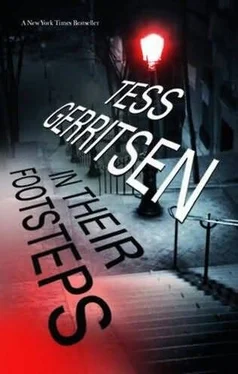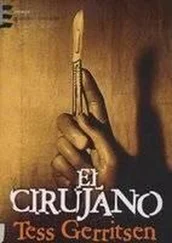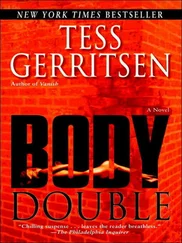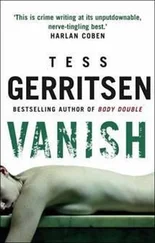Tess Gerritsen - In Their Footsteps
Здесь есть возможность читать онлайн «Tess Gerritsen - In Their Footsteps» — ознакомительный отрывок электронной книги совершенно бесплатно, а после прочтения отрывка купить полную версию. В некоторых случаях можно слушать аудио, скачать через торрент в формате fb2 и присутствует краткое содержание. Жанр: Триллер, на английском языке. Описание произведения, (предисловие) а так же отзывы посетителей доступны на портале библиотеки ЛибКат.
- Название:In Their Footsteps
- Автор:
- Жанр:
- Год:неизвестен
- ISBN:нет данных
- Рейтинг книги:5 / 5. Голосов: 1
-
Избранное:Добавить в избранное
- Отзывы:
-
Ваша оценка:
- 100
- 1
- 2
- 3
- 4
- 5
In Their Footsteps: краткое содержание, описание и аннотация
Предлагаем к чтению аннотацию, описание, краткое содержание или предисловие (зависит от того, что написал сам автор книги «In Their Footsteps»). Если вы не нашли необходимую информацию о книге — напишите в комментариях, мы постараемся отыскать её.
In Their Footsteps — читать онлайн ознакомительный отрывок
Ниже представлен текст книги, разбитый по страницам. Система сохранения места последней прочитанной страницы, позволяет с удобством читать онлайн бесплатно книгу «In Their Footsteps», без необходимости каждый раз заново искать на чём Вы остановились. Поставьте закладку, и сможете в любой момент перейти на страницу, на которой закончили чтение.
Интервал:
Закладка:
Richard and Beryl were shoved forward into a windowless room. “Stay here!” came the barked command, then the door was slammed shut behind them.
“They were waiting for us,” said Beryl. “How did they know?”
Richard went to the door and tested the knob. “Dead bolt,” he muttered. “We’re locked in tight.” In frustration, he began to circle the room, searching for another way out. “Somehow they knew we were coming to Berlin…”
“We paid for the tickets in cash. There was no way they could have known. And those were airport guards, Richard. If they want us dead, why bother to arrest us?”
“To keep you from getting your heads shot off,” said a familiar voice. “That’s why.”
Beryl wheeled around in astonishment at the portly man who’d just opened the door. “Uncle Hugh? ”
Lord Lovat scowled at his niece’s wrinkled clothes and tangled hair. “You’re a fine mess. Since when did you adopt the gypsy look?”
“Since we hitchhiked halfway across Greece. Credit cards, by the way, are not the preferred method of payment in small Greek towns.”
“Well, you made it to Berlin.” He glanced at Richard. “Good work, Wolf.”
“I could’ve used some assistance,” growled Richard.
“And we would’ve happily provided it. But we had no idea where to find you, until I spoke with your man, Sakaroff. He said you’d be headed for Berlin. We only just found out you’d gone via Athens.”
“What are you doing in Berlin, Uncle Hugh?” demanded Beryl. “I thought you were off on another one of your secret missions.”
“I’m fishing.”
“Not for fish, obviously.”
“For answers. Which I’m hoping Heinrich Leitner will provide.” He took another look at Beryl’s clothes and sighed. “Let’s get to the hotel and clean you both up. Then we’ll pay a visit to Herr Leitner’s prison cell.”
“You have clearance to speak to him?” said Richard in surprise.
“What do you think I’ve been doing here these last few days? Wining and dining the necessary officials.” He waved them out of the room. “The car’s waiting.”
In Uncle Hugh’s hotel suite, they showered off three days’ worth of Greek dust and sand. A fresh set of clothes was delivered to the room, courtesy of the concierge-sober business attire, outfits appropriate for a visit to a high-security prison.
“How do we know Leitner will tell us the truth?” asked Richard as they rode in the limousine to the prison.
“We don’t,” said Hugh. “We don’t even know how much he can tell us. He oversaw Paris operations from East Berlin, so he’d be acquainted with code names, but not faces.”
“Then we may come away with nothing.”
“As I said, Wolf, it’s a fishing expedition. Sometimes you reel in an old tire. Sometimes a salmon.”
“Or, in this case, a mole.”
“If he’s cooperative.”
“Are you prepared to hear the truth?” asked Richard. The question was directed at Hugh, but his gaze was on Beryl. Delphi could still be Bernard or Madeline, his eyes said.
“Right now, I’d say ignorance is far more dangerous,” Hugh observed. “And there’s Jordan to consider. I have people watching out for him. But there’s always the chance things could go wrong.”
Things have already gone wrong, thought Beryl, looking out the car window at the drab and dreary buildings of East Berlin.
The prison was even more forbidding-a massive concrete fortress surrounded by electrified fences. The very best of security, she noted, as they moved through the gauntlet of checkpoints and metal detectors. Uncle Hugh had obviously been expected, and he was greeted with the chilling disdain of an old Cold War enemy. Only when they’d arrived at the commandant’s office was any courtesy extended to them. Glasses of hot tea were passed around, cigars offered to the men. Hugh accepted; Richard declined.
“Up until recently, Leitner was most uncooperative,” said the commandant, lighting a cigar. “At first, he denied his role entirely. But our files on him are proof positive. He was in charge of Paris operations.”
“Has Leitner provided any names?” asked Richard.
The commandant peered at Richard through the drifting cloud of cigar smoke. “You were CIA, were you not, Mr. Wolf?”
Richard gave only the briefest nod of acknowledgment. “It was years ago. I’ve left the business.”
“But you understand how it is, to be dogged by one’s past associations.”
“Yes, I understand.”
The commandant rose and went to look out his window at the barbed-wire fence enclosing his prison kingdom. “Berlin is filled with people running from their shadows. Their old lives. Whether it was for money or for ideology, they served a master. And now the master is dead and they hide from the past.”
“Leitner’s already in prison. He has nothing to lose by talking to us.”
“But the people who worked for him-the ones not yet exposed-they have everything to lose. Now the East German files are open. And every day, some curious citizen opens one of those files and discovers the truth. Realizes that a friend or husband or lover was working for the enemy.” The commandant turned, his pale blue eyes focused on Richard. “That’s why Leitner has been reluctant to give names-to protect his old agents.”
“But you say he’s more cooperative these days?”
“In recent weeks, yes.”
“Why?”
The commandant paused. “A bad heart, the doctors say. It fails, little by little. In two months, three…” He shrugged. “Leitner sees the end coming. And in exchange for a few last comforts, he’s sometimes willing to talk.”
“Then he may give us answers.”
“If he is in the mood.” The commandant turned to the door. “So, let us see what sort of mood Herr Leitner is in today.”
They followed him down secured corridors, past mounted cameras and grim-faced guards, into the very core of the complex. Here there were no windows; the air itself seemed hermetically sealed from the outside world. From here there is no escape, thought Beryl. Except through death.
They stopped at cell number five. Two guards, each with his own key, opened separate locks. The door swung open.
Inside, on a wooden chair, sat an old man. Oxygen tubing snaked from his nostrils. His regulation prison garb-tan shirt and pants, no belt-hung loosely on his shrunken frame. The fluorescent lights gave his face a yellowish cast. Beside the man’s chair stood an oxygen tank; except for the hiss of the gas flowing through his nasal prongs, the room was silent.
The commandant said, “ Guten Tag, Heinrich.”
Leitner said nothing. Only by a brief flicker of his eyes did he acknowledge the greeting.
“I have brought with me today, Lord Lovat, from England. You are familiar with the name?”
Again, a flicker in the old man’s blue eyes. And a whisper, barely audible, “MI6.”
“That’s right,” said Hugh. “Since retired.”
“So am I,” was the reply, not without a trace of humor. Leitner’s gaze shifted to Beryl and Richard.
“My niece,” said Hugh. “And a former associate. Richard Wolf.”
“CIA?” said Leitner.
Richard nodded. “Also retired.”
Leitner managed a faint smile. “How differently we enjoy our retirements.” He looked once again at Hugh. “A social call on an old enemy? How thoughtful.”
“Not a social call, exactly,” said Hugh.
Leitner began to cough, and the effort seemed almost too much for him; when at last he settled back into his chair, his face had a distinctly blue tinge. “What is it you wish to know?”
“The identity of your double agent in Paris. Code name Delphi.”
Читать дальшеИнтервал:
Закладка:
Похожие книги на «In Their Footsteps»
Представляем Вашему вниманию похожие книги на «In Their Footsteps» списком для выбора. Мы отобрали схожую по названию и смыслу литературу в надежде предоставить читателям больше вариантов отыскать новые, интересные, ещё непрочитанные произведения.
Обсуждение, отзывы о книге «In Their Footsteps» и просто собственные мнения читателей. Оставьте ваши комментарии, напишите, что Вы думаете о произведении, его смысле или главных героях. Укажите что конкретно понравилось, а что нет, и почему Вы так считаете.












